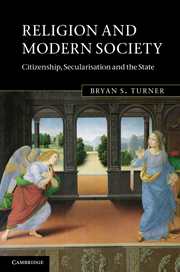Book contents
- Frontmatter
- Contents
- Acknowledgements
- Introduction: the state of the sociology of religion
- Part I Theoretical frameworks: the problem of religion in sociology
- Part II Religion, state and post-secularity
- 7 The secularisation thesis
- 8 Legal pluralism, religion and multiculturalism
- 9 Managing religions: liberal and authoritarian states
- 10 Religious speech: on ineffable communication
- 11 Spiritualities: the media, feminism and consumerism
- 12 Religion, globalisation and cosmopolitanism
- 13 Civil religion, citizenship and the business cycle
- 14 The globalisation of piety
- References
- Index
12 - Religion, globalisation and cosmopolitanism
Published online by Cambridge University Press: 05 June 2012
- Frontmatter
- Contents
- Acknowledgements
- Introduction: the state of the sociology of religion
- Part I Theoretical frameworks: the problem of religion in sociology
- Part II Religion, state and post-secularity
- 7 The secularisation thesis
- 8 Legal pluralism, religion and multiculturalism
- 9 Managing religions: liberal and authoritarian states
- 10 Religious speech: on ineffable communication
- 11 Spiritualities: the media, feminism and consumerism
- 12 Religion, globalisation and cosmopolitanism
- 13 Civil religion, citizenship and the business cycle
- 14 The globalisation of piety
- References
- Index
Summary
Introduction: paradoxes of religion and modernity
In the modern world, religion and nationalism have often functioned as modes of individual and collective identity in a global political context. Both religious and nationalist modes of self-reference are products of a common process of modernisation, of which globalisation can be regarded as the current phase. Just as nationalism can assume either liberal or reactionary forms (Kohn, 1944), so religion can adopt either an ecumenical/cosmopolitan or an exclusive/fundamentalist orientation. From the late nineteenth century, citizenship became increasingly the dominant juridical framework of civil society as the mode of national membership and individual identity. In Europe and North America, national citizenship emerged as a secular form of solidarity that either competed or combined with the Church to provide a potent channel of nationalist identity and fervour. With growing national assertion and competition, citizenship became primarily an institution of ‘national manhood’ (Nelson, 1998), in which entitlements to citizenship benefits were based on work and warfare. As state sovereignty was territorial, citizenship became an exclusionary principle of identity and membership within a given terrain. With the collapse of communism in the Soviet Union and the transformation of China towards authoritarian capitalism, religion can once again blend with nationalism to provide the cultural glue that national citizenship requires to develop common rituals and communal organisation. However, the precise relationship between religion, nation and state is clearly variable.
- Type
- Chapter
- Information
- Religion and Modern SocietyCitizenship, Secularisation and the State, pp. 228 - 254Publisher: Cambridge University PressPrint publication year: 2011



